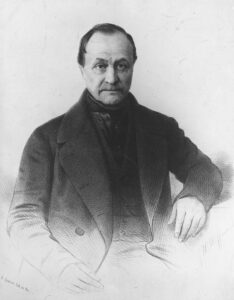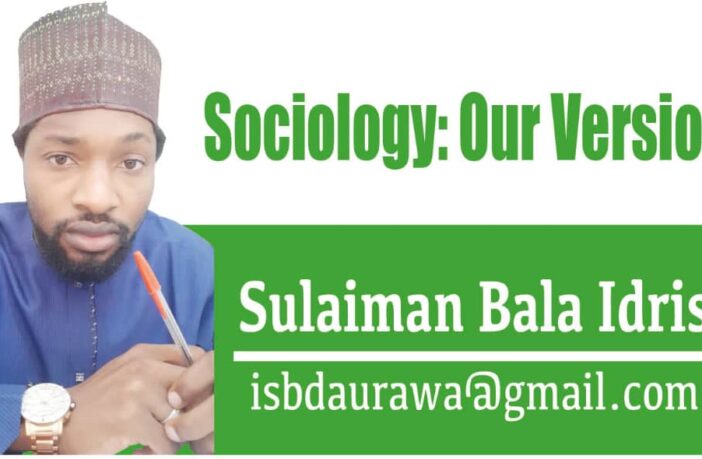Nobody can thieve from Comte, the credit of founding Sociology. Comte may have so many lapses and susceptible to criticisms. He was never a practical scholar, he lived and died in a serious mess; an ambivalent unserious human being who was said to had married a registered prostitute, Anna Caroline Massin.
(PICTURE: Auguste Comte)
Comte was diagnosed as ‘Mania Depressive’, was also rescued from an attempted suicide in 1827. He met Clotilde De Vaux, whom he had a very emotional love affair. Her death in 1846 was what influenced Comte’s decision to transform his thought from positivism of science to positivism as a religion of humanity.
Despite all the controversies in Comte’s life, we cannot deny him the credit for a great job of coining the term ‘SOCIOLOGY’. Prior to 1838, social thoughts were strictly philosophical in nature, and it was the logic of Comte to emancipate Sociology from moral Philosophy; by providing a framework which established Sociology into the realm of science.
I was never fascinated to write on reasons why Ibn Khaldun failed to make it as the founder of Sociology, but a portion of students were pushing the argument beyond control. Some misconstrued facts, and consider it as Eurocentricism, just because Ibn Khaldun was not from Europe. Just because Khaldun was a Muslim scholar, etcetera.
Before I proceed, we should know that in the Khaldunian enterprise there are scholars who were not been able to prove beyond reasonable doubt that Ibn Khaldun was the founder, rather only made efforts to secure for Khaldun a position as one of the fathers of Sociology. None of us could afford to shield Ibn Khaldun as Gumplowicz, Kremer, Flint, and Ortega Gasset did. In fact, Becker and Barnes in their work, ‘Social Thought from Lore to Science’, first published in 1938, devoted many pages to a discussion of the ideas of Ibn Khaldun, recognizing that he was the first to apply modern like ideas in Historical Sociology, but not as the founder of the well sophisticated Scientific Sociology.
(PICTURE: Ibn Khaldun)
Prior to Khaldunian thought, from 551 to 479 BCE, there was a scholar called Confucius, who theorizes life and society. His work is primarily known through the Analects of Confucius, compiled by his disciples later. What about Socrates (469-399 BCE), Aristotle (384-322BCE) and Plato. Both Aristotle and Plato were remarkably important in Population Studies, and Demography. If Khaldunian cyclical thought is the automatic ticket for Khaldun to be the founder not just among the fathers of Sociology, then, we are free to use our subjective minds to consider Aristotle and Plato as the founders of Sociology, as predecessors of Population and Demography.
Before you argue further, or tag me as Eurocentric brainwashed Sociologist, argue with the factual revelations in my argument. Before the tag begins, have you ever read about Abu Rayhan Muhammad Ibn Ahmad al Biruni? He came and did Sociology before Khaldun. Al-Biruni (973–1048 CE) was born in the city of Khwarazm (modern Khiva) in what is today known as Uzbekistan. Al-Biruni went to India with the troops of Mahmud and remained there for many years. During this time, he studied Sanskrit, translated a number of Indian religious texts, and conducted research on Indian religions and their doctrines.
Al Biruni was the first Muslim and probably the first scholar to provide a systematic account of the religions of India from a Sociological point of view. Furthermore, his work is considered to be a vital source of knowledge of Indian history and society in the eleventh century, providing details of the religion, philosophy, literature, geography, chronology, astronomy, customs, laws, and astrology of India.
I knew Al-Biruni through Syed Farid Alatas, the author of ‘Applying Ibn Khaldun: The Recovery of a Lost Tradition in Sociology’. Syed Farid Alatas was once Head of the Department of Malay Studies and Associate Professor of Sociology at the National University of Singapore, a self-avowed Khaldunian and master in the study of Ibn Khaldun.
For our information, Auguste Comte had never crossed Khaldunian Muqaddimah as a precursor for coining the term ‘Sociology’. In the latter part of the seventeenth century a biography of Ibn Khaldun appeared in d’Herbelot’s Bibliotheque Orientale. However, it was then more than 100 years before translations of Ibn Khaldun appeared. A French translation of extracts of Ibn Khaldun’s works, undertaken by Silvestre de Sacy, appeared in 1810. Joseph von Hammer-Purgstall published extracts of the Muqaddimah in German (1818, 1822). William MacGuckin de Slane’s French translation of the Muqaddimah appeared between 1862 and 1868, and Comte set forth his detailed vision and program of Sociology in his six-volume work Cours de philosophie positive, from 1830 to 1842.
It is apparent that there was no connection whatsoever between the two Sociological giants. AbdulRahman had contributed immensely in random areas that affects Sociology and other fields of study. What he did was a general study in a Philosophical manner. While Comte was very critical and prudent in carving a niche for what he term ‘SOCIOLOGY’, he was specific, and thanks to him for that.
This article was first published on the 16th of July, 2017, edited and republished on the 6th of February 2020.




